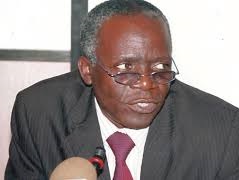 |
| Femi Falana (SAN) |
Human rights lawyer, Mr Femi Falana (SAN), has said he is planning to write to the Attorney General of the Federation, Mr Abubakar Malami (SAN), to demand answers on why the President Muhammadu Buhari-led Federal Government has been disobeying court orders.
The activist lawyer said he recalled that even when Buhari ruled the country in the 80s as a military dictator, orders of court were never disobeyed.
Falana said this in Lagos on Thursday during the public lecture marking the 30th anniversary of the Committee for the Defence of Human Rights.
The lecture, with the theme, ‘Chronicling the struggle, identifying the way forward,” was delivered by a Professor of International Law and Jurisprudence, Akin Oyeboye; while Prof. Julius Honvhere of the Ford Foundation was the keynote speaker.
Speaking in his capacity as the chairman of the CDHR Board of Trustees, Falana said the struggle for the respect of human rights in the country had made a lot of gains in the last 30 years.
“Thirty years ago, it would have been impossible to assemble to discuss human rights in our country. Notwithstanding that we are currently having what you might call rickety democracy, there are gains, all the struggles of over 30 years, that we must celebrate today,” Falana said.
The lawyer, however, said he was worried about how court orders were being disobeyed by the Federal Government.
He said, “I just remember this morning trying to write a letter to the Attorney General of the Federation and I found, very painfully, that whereas the Buhari/Idiagbon regime complied with all court orders for the release of those who were held illegally under the state security detention of persons Decree No 2 of 1984, we cannot say the same today under a democratic government.”
In his lecture, Oyebode criticised the 1999 Constitution, which he said lacked legitimacy because the Gen. Abdulsalami Abubakar regime did not call for the input of the citizens.
“The general contempt held by the dictators everywhere for the people informed the attitude of the junta towards the right of the Nigerian people to partake in the making of the most important law governing their lives,” the don said.
Oyebode said for Nigeria to become a liberal democratic society, the people must be ready to put the government on its toes “so that an end is speedily brought to impunity.”
In his remarks, the National President of CDHR, Mr Malachy Ugwummadu, described the organisation’s journey in the last 30 years as “eventful; a mix bag but clearly with huge prospects and possibilities of fulfillment.”
The activist lawyer said he recalled that even when Buhari ruled the country in the 80s as a military dictator, orders of court were never disobeyed.
Falana said this in Lagos on Thursday during the public lecture marking the 30th anniversary of the Committee for the Defence of Human Rights.
The lecture, with the theme, ‘Chronicling the struggle, identifying the way forward,” was delivered by a Professor of International Law and Jurisprudence, Akin Oyeboye; while Prof. Julius Honvhere of the Ford Foundation was the keynote speaker.
Speaking in his capacity as the chairman of the CDHR Board of Trustees, Falana said the struggle for the respect of human rights in the country had made a lot of gains in the last 30 years.
“Thirty years ago, it would have been impossible to assemble to discuss human rights in our country. Notwithstanding that we are currently having what you might call rickety democracy, there are gains, all the struggles of over 30 years, that we must celebrate today,” Falana said.
The lawyer, however, said he was worried about how court orders were being disobeyed by the Federal Government.
He said, “I just remember this morning trying to write a letter to the Attorney General of the Federation and I found, very painfully, that whereas the Buhari/Idiagbon regime complied with all court orders for the release of those who were held illegally under the state security detention of persons Decree No 2 of 1984, we cannot say the same today under a democratic government.”
In his lecture, Oyebode criticised the 1999 Constitution, which he said lacked legitimacy because the Gen. Abdulsalami Abubakar regime did not call for the input of the citizens.
“The general contempt held by the dictators everywhere for the people informed the attitude of the junta towards the right of the Nigerian people to partake in the making of the most important law governing their lives,” the don said.
Oyebode said for Nigeria to become a liberal democratic society, the people must be ready to put the government on its toes “so that an end is speedily brought to impunity.”
In his remarks, the National President of CDHR, Mr Malachy Ugwummadu, described the organisation’s journey in the last 30 years as “eventful; a mix bag but clearly with huge prospects and possibilities of fulfillment.”
In this article:
